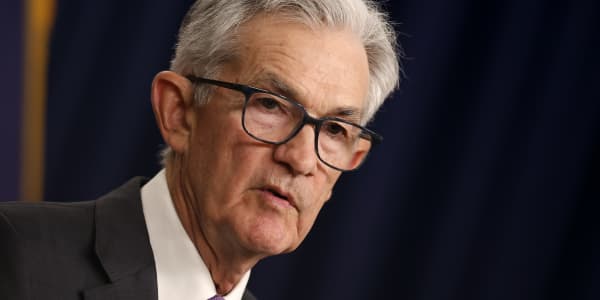This report is from today's CNBC Daily Open, our new, international markets newsletter. CNBC Daily Open brings investors up to speed on everything they need to know, no matter where they are. Like what you see? You can subscribe here.
What you need to know today
Mixed signals
U.S. stocks slumped Friday amid mixed sentiment about the economy. Only the Dow Jones Industrial Average rose for the week. Asia-Pacific markets mostly fell Monday. Hong Kong's Hang Seng Index lost 1.4%, but China's Shanghai Composite bucked the sell-off and ticked up 0.26%.
Less adventurous investors in China
Venture capital firms in China invested $26.7 billion in 3,072 deals during the first half of the year, according to PitchBook. That's an annualized 31.4% drop from 2022. China's economy — while showing signs of picking up lately — is still sluggish, impeding early-stage investment. Moreover, geopolitical tensions are dissuading foreign investors from venturing into the Chinese market.
Pausing at the peak
Major central banks around the world have likely reached peak interest rates. That is, analysts and economists don't expect them — such as the European Central Bank, the Federal Reserve and the Bank of England — to raise rates any further. But that doesn't mean the banks are ready to cut rates because challenges, like higher oil prices and stubborn inflation, remain.
A fragmenting global economy
The new ship-and-rail economic corridor linking India, the Middle East and Europe is a sign of how geopolitical tensions are fragmenting the global economy. The corridor, which is backed by U.S. President Joe Biden, is seen by some as a response to China's Belt and Road Initiative. But to countries on the ground, the narrative is "about multiplication/addition, not subtraction," said a researcher.
[PRO] FOMC meeting this week
The Federal Reserve's meeting on Wednesday will be the main event to keep an eye on for this week. Markets are betting the Fed will hold rates steady for now, but the trajectory of rates in November is still up in the air. FedEx will announce its fiscal first-quarter earnings on the same day, giving an insight into how the global supply chain's holding up.
The bottom line
U.S. consumer sentiment, according to the University of Michigan Surveys of Consumers, edged down from 69.5 in August to 67.7 in September, more than economists had expected. To put that reading in perspective, the all-time low of 50 was in June 2022 (when annual inflation hit 9.1%), and the historical average is 86.
In other words, consumer sentiment's improving, but still not great.
On the bright side, consumers now expect inflation to drop to 3.1% in a year, the lowest figure since January 2021.
But if you want to be pessimistic about it, those two data points — lack of confidence about the economy but hopeful about inflation falling — suggest that consumers think inflation will drop in a year because things won't be great for the economy. That is, the scary R-word will arrive eventually, depressing prices.
The mood on Wall Street, however, is markedly different. "Investors remained upbeat about the outlook for stocks and the economy in August," according to a Vanguard Investor Expectations Survey. They expected stocks to return 5.5% over the next 12 months and thought there's only a 5.4% chance of an "economic disaster" in the coming 12 months.
Indeed, corporate earnings could see a rebound in the fourth quarter this year, Edward Jones senior investment strategist Mona Mahajan told CNBC's "Squawk on the Street." The rebound in earnings could even hit double-digits in 2024, Mahajan added.
Does Wall Street know something that ordinary U.S. consumers don't? Or are consumers just more realistic than investors, who are still relishing the unexpected rally in stocks this year? (Investors who are luxuriating in the rally may want to heed Ray Dalio's warning about expensive markets.)
Whatever the case, that exuberance didn't show up for stocks last week. On Friday, the S&P 500 dropped 1.22%, the Dow Jones Industrial Average lost 0.83% and the Nasdaq Composite sank 1.56%.
The Dow, with its 0.12% weekly increase, was the only index to finish in the green. The S&P and Nasdaq were 0.16% and 0.39% lower for the week, respectively.
"I think having digested the additional economic data that's come out, as well as ongoing geopolitical pressures and other developments, we're seeing today investors pulling back and taking a breather," AXS Investments' Greg Bassuk said.
With the Fed expected to keep interest rates unchanged at its September meeting on Wednesday, investors may take an extended breather this week. In that open space between breaths, equilibrium between Wall Street and main street may be reached.
Correction: An earlier version of this report misstated the day on which Japan's Nikkei rose. The error has been removed.





